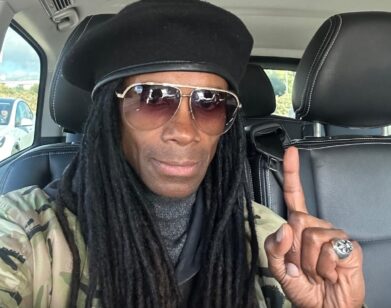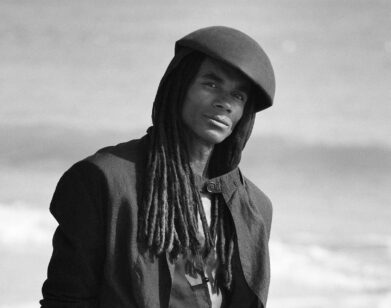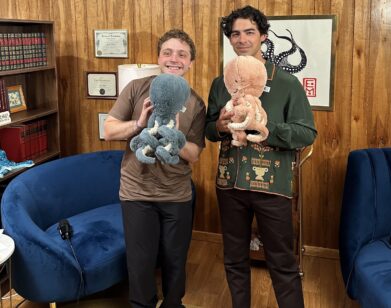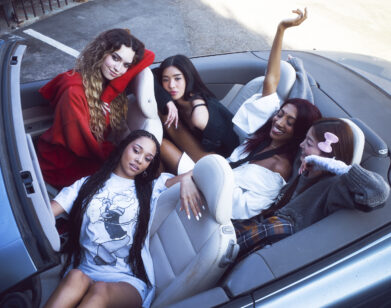Discovery: Max Frost

ABOVE: MAX FROST. PHOTO COURTESY OF JASON HARO.
Everything began early for Max Frost. Born and raised in Austin, Texas, Frost started playing local gigs at the age of 12. By 16, he was opening for his current tourmate Gary Clark Jr. in the bands Blues Mafia. By 17, he switched from being a guitarist in bands to singing solo. Now only 21, the singer is releasing his first EP, Low High Low, via Atlantic. “It’s based in pop,” Frost says of his new record. “But it’s got a blend of a lot of genres—I sing in a way that’s blues, but I execute instruments in a way that’s more funk or hip-hop.”
Among the five songs on the record is his blog-topping single, the pop-soul relationship lamentation,”White Lies.” Frost, however, is not opposed to the odd white lie himself: “I don’t consider myself a critic,” he explains us over the phone in between music video takes. “Unless someone came to me and was like, ‘Really, Max, I want you tell me exactly what you think about this song.’ I’ve never been one to hand out my opinion about other people’s work. That’s not really my place.”

AGE: 21
HOMETOWN: Austin
WORST NIGHTMARE: I used to have this weird, constant nightmare when I was a little kid. I had this fear of geese because when I was super young they were my height. A goose, when you’re five, is like a dinosaur that wants to kill you. So I would have nightmares about geese coming and chasing me. It’s been a while; now my height in proportion to the geese has gotten me over the fear. I’m still not a big fan. They’re kinda nasty. All geese, and swans especially, have a bad attitude in general. They’re just very cranky animals.
POP PERFECTION: I think “Thriller” is a great example of a pop song. Within the industry, a lot of writers and a lot of people seem to be focused on writing the pop song that’s all about the bigger picture, context of the song—what is the song about, and why will that meaning really connect with people? I wouldn’t necessarily throw that aside if you’re trying to write a pop song, but I really believe that the idea of pop has nothing to do with the bigger picture, context of the song. It’s only what the phrase could mean on those specific melodies. I think some of the greatest pop songs, people don’t even know what they’re about. No one knows what the words to “Smells like Teen Spirit” are, or a lot of those songs. It’s more about the soul within it that seems to connect with pop than the message or the words. I think a good pop song [requires] honesty and energy that is communicated in a culturally relevant way.
BARELY LEGAL: Being 21 is great. It’s so much less stressful, because it was always a big problem when I was playing shows when I was young. They always wanted to “x” my hands or have me wait outside until it was show time or something. So just on the gig side of things, it is a big stress relief. I’ve never been denied entry to a show I was playing, but I’ve been kicked out of so many shows after I was done playing.
MIDDLE SCHOOL COOL: I started playing shows at 11, 12. Some gigs around town, some small stuff. I was in a band called Joy Ride with a bunch of other guys that were a little bit older than me—maybe only 14 to 16. I remember when we were doing private parties and some stuff like that, but it wasn’t really intense interest in until I was 16. We had the bond over music so I ended up meeting a lot of people older than me at that age for a while. Kind of still the same way today, really.
PLAYING TO AN EMPTY ROOM: I’ve lost count of how many shows I’ve done in coffee shops or in slum bars where there’s totally nobody there. I think the trick is that if you’re really focused on your art and if you can sit there and enjoy what you’re doing playing for nobody, then you’re at least on the right path of loving what you do. As rough as it is, to do a gig where there’s not a lot going on, as long as you felt like you musically executed things well, then you could just consider it a paid rehearsal or a cheaply paid rehearsal, depending on how much you got for the gig.
BETWEEN THE LINES: With all great art—especially with songs—that it’s impossible to fully communicate anyone’s personal understanding of what something means. People are looking to connect—for something in it where they can put their own pain and their own experience and lives and feel it represented in that. There has to be a blank part missing; if you write a song that’s completely narrative of something very specific that happened in your own life and there’s no open-ended questions, if there’s no space for another person to put in what they think or they’re imagining, then you’re closing it off to them. I think the best example of it is that is that Bob Dylan song, “How many roads must a man walk down before you call him a man?” He’s just asking all these questions. He’s not making any statements. So within the questions that he’s putting out there, people are filling that in with greatness that fits their own sense of euphoria. It’s not something he can force them to feel. The song is more just a canvas for them to feel it.
LOW HIGH LOW IS OUT NOW. FOR MORE ON MAX FROST, VISIT HIS WEBSITE.






